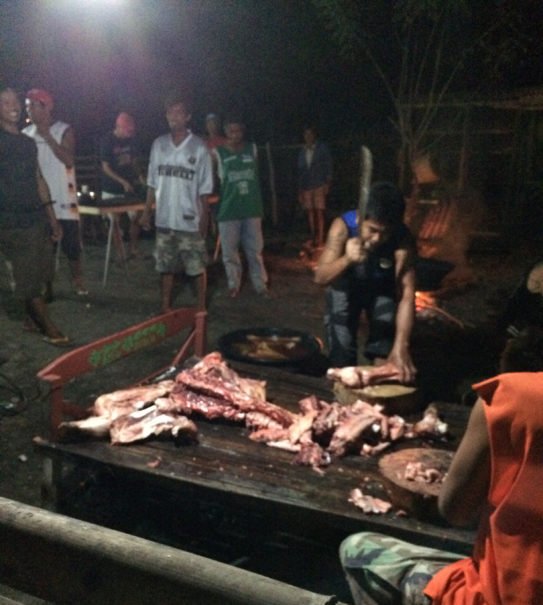
It Takes A Village to Eat A Cow for Breakfast

It Takes A Village to Eat A Cow for Breakfast
Breakfast in the Philippines
My knees had turned a crusty crimson and the sweat on my palms had all but dried. I smiled as faces danced around me in a feverish trance. Women cheered on, their cell phones capturing the moment.
The cow, tied and momentarily stunned, had been pulled to the ground with a heavy thud. A blade separated the skin from around her throat. There had been no protest as the beige fur turned sticky. A man reached in and cupped the blood in his hands before carefully transferring it to the plastic container. The cow huffed as her life was slowly bled away.
After celebratory photos with the carcass were taken, a group of men marched forward. The animal was disemboweled, cigarette ash falling onto the warm meat. Throughout the night, friends arrived, all bringing forth their own skills and expertise. There was one man who cleaned the intestines of grime, the women who sliced vegetables with surgical proficiency.
From one animal, a colorful array of dishes emblematic of Filipino cuisine would materialize. The bulk of the meat was reserved for the Christening that day, but breakfast would entail a sampling of all the dishes. The tail and tendons were cooked with peanut butter and fish sauce (kare-kare). The skin was scorched and sliced thinly, a chewy treat be enjoyed with a squirt of calamansi. The stomach was cut into ribbons, ready to be thrown into a grass-green broth of bile and ginger. Raw slices of beef were mixed in a bowl, also dressed in fresh bile juices and chopped chilies.
I looked down at the meat-heavy breakfast before me. Was I fortunate to be here, on a remote farm in the Philippines, watching 50 people prepare foods they could so seldom afford to consume? Or was I unfortunate, right to feel saddened by the slow death of the animal?
The cow had died painfully and here I stood, with her body reconfigured as a breakfast buffet before me. Domesticated dogs fought for stray bones and discarded pieces of meat. Women hugged each other as men finished preparing the dishes. I closed my eyes, letting the sound of laughter and the crackle of burning twigs dissipate the visions of the night. I washed the blood off my shins and joined the crowd at one of the tables. “You must eat!” I was instructed as they piled my plate with fresh rice. “Eat, eat!”
I nodded and thanked the women. I scooped up the raw meat with my fingers and absorbed the conversations, all the laughter and celebration going on around me. I felt very fortunate indeed.